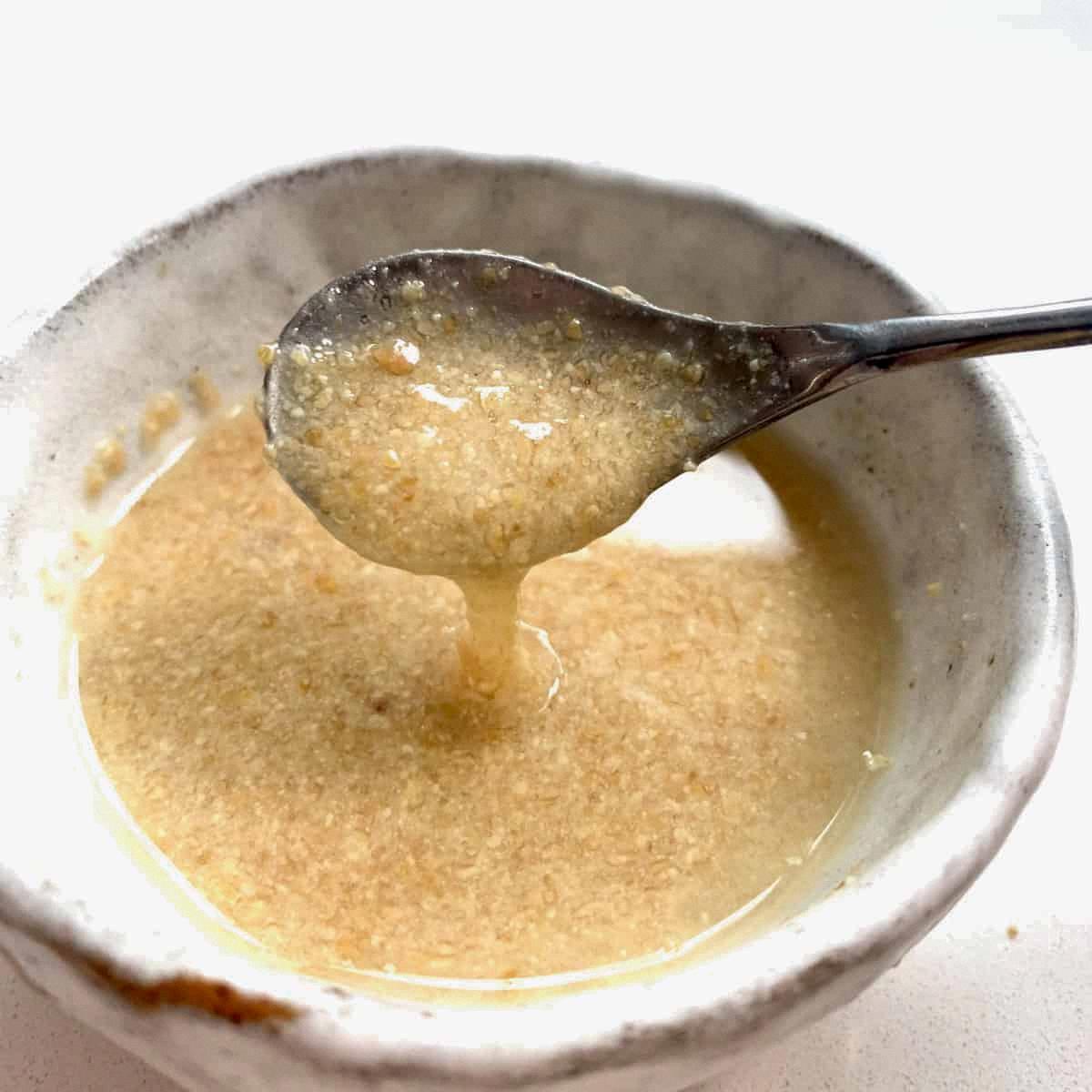If you’re lookng for a natural way to relieve constipation, then flaxseed may be the answer for you. Flaxseed, also known as linseed, is a small, brown seed that is high in fiber and omega-3 fatty acids. It has been used for hundreds of years as a natural remedy for constipation and other digestive issues.
Studies have shown that flaxseed is an effective laxative, with results seen within 12 to 24 hours of taking it. The high fiber content in flaxseed helps to bulk up your stool, making it easier to pass. Additionally, the omega-3 fatty acids in flaxseed have anti-inflammatory properties that can help soothe any inflammation in your digestive tract, further easing constipation.
To use flaxseed as a natural laxative, simply add 1-2 tablespoons to your diet each day. You can sprinkle it on your cereal or yogurt, mix it into your smoothie, or even add it to your baking. It’s important to drink plenty of water throughout the day when taking flaxseed, as it needs fluid to work properly.
It’s also worth noting that while flaxseed can act within 12-24 hours, it may take 2-3 days to reach its maximum effect. Additionally, it’s normal to see the seeds in your stool, as they are not fully digested. This is nothing to worry about and is a sign that the flaxseed is working its way through your digestive system.
In addition to its laxative properties, flaxseed is also ideal for anyone who suffers from frequent bloating. The high levels of fiber in the seeds will keep your digestive system in good health, helping to reduce and remove any bloated feelings.
Flaxseed is a natural and effective way to relieve constipation and promote good digestive health. With its numerous health benefits, including its ability to reduce bloating and improve heart health, it’s no wonder that flaxseed is becoming increasingly popular as a natural health supplement. So, if you’re looking for a natural way to keep things moving in your digestive system, give flaxseed a try and see the results for yourself.
The Laxative Effects of Flaxseed
Flaxseed has been shown to have a laxative effect. Flaxseed is a good source of dietary fiber, which helps to promote regular bowel movements and prevent constipation. The fiber in flaxseed absorbs water and adds bulk to the stool, making it easier to pass. In addition, flaxseed contains compounds called lignans, which have been shown to have a mild laxative effect. Studies have found that consuming flaxseed can help to increase bowel movements and relieve constipation. It is recommended to drink plenty of water when consuming flaxseed to help with the laxative effect. The results of using flaxseed as a laxative can usually be seen wihin 12 to 24 hours after ingestion.

Source: thespruce.com
The Effects of Flaxseed on Bowel Movements
Flaxseed, also known as linseed, can act as a natural laxative and help promote bowel movements. The time it takes for flaxseed to make you poop can vary from person to person, but typically it can take anywhere from 12 to 24 hours for the effects to start taking place. However, it may take 2 to 3 days to reach the maximum effect. It is important to note that it is common to see flaxseed in the stool, wich is normal. To ensure the best results, it is recommended to drink around 2 liters of fluid in a day as too little fluid can cause constipation and flaxseed needs fluid to make them work properly.
The Benefits of Taking Flaxseed Every Day
It is generally safe to consume flaxseed on a daily basis. In fact, flaxseed is a rich source of fiber, protein, and healthy omega-3 fatty acids, which have been assocated with a range of health benefits, including improved heart health, reduced inflammation, and better digestive function. However, it is important to note that excessive consumption of flaxseed may lead to digestive issues and interfere with nutrient absorption. It is also important to drink plenty of water when consuming flaxseed, as it can absorb liquids and expand in the digestive tract. As with any dietary supplement, it is recommended to consult with a healthcare professional before adding it to your daily routine.
The Effects of Flaxseed on Abdominal Fat Reduction
Flaxseed is known to have several health benefits, including aiding in weight loss and reducing belly fat. Flaxseeds are rich in soluble and insoluble fiber, which helps to keep you feeling full and satiated for a longer period of time, reducing your overall calorie intake. Additionally, flaxseeds contin lignans, which have been shown to reduce the risk of breast cancer and help regulate hormones that are linked to weight gain. Moreover, flaxseeds have anti-inflammatory properties that can help reduce inflammation in the gut, which can cause bloating and discomfort. While flaxseeds alone may not be a magic solution for flattening your stomach, they certainly can be a helpful addition to a healthy diet and exercise routine for achieving a trimmer midsection.
The Optimal Time to Consume Flax Seeds
The best time to eat flax seeds is in the morning or at bedtime. In the morning, consuming flax seeds can help kickstart your metabolism and provide you with a steady supply of energy throughout the day. Moreover, flax seeds contain high levels of fiber, whih can help keep you feeling fuller for longer periods and reduce your cravings for unhealthy snacks. When taken at bedtime, flax seeds can increase your levels of fatty acids, which may help in fighting heart diseases by regulating blood cholesterol and lowering blood pressure. Additionally, flax seeds can act as a natural laxative, promoting healthy bowel movements and reducing constipation. incorporating flax seeds into your daily diet can offer a range of health benefits, and the best time to consume them depends on your individual needs and preferences.

Source: plantselect.org
The Benefits of Taking Flaxseed for Bowel Regularity
To relieve constipation, you will need to consume 1 to 4 tablespoons of ground flaxseed per day. It is important to note that flaxseed oil and whole seeds might not be as effective as ground flaxseed. Ground flaxseed can easily be incorporated into your diet by stirring it into oatmeal, soup, or cereal for added fiber. You can also add it to yogurt or smoothies. By consuming the recommended amount of ground flaxseed daily, you may experience relief from constipation.
Side Effects of Eating Flax Seeds
Flaxseed is a nutritious food that offers many health benefits, but it can cause certain side effects when consumed in excess. One of the most common side effects of eating flax seeds is digestive discomfort, including bloating, gas, stomachache, and nausea. These symptoms are often the result of the high fiber content of flaxseed, which can be difficult for some people to digest.
In addition to digestive issues, consuming large amounts of flaxseed can also increase the number of bowel movements per day, which may be uncomfortable or inconvenient for some individuals. It’s important to note that thee side effects are generally mild and can be managed by reducing the amount of flaxseed consumed or by gradually increasing intake to allow the body to adjust.
It’s also worth mentioning that some people may be allergic to flaxseed, which can cause more serious side effects such as hives, difficulty breathing, and anaphylaxis. If you experience any of these symptoms after consuming flaxseed, seek medical attention immediately.
Flaxseed is a safe and nutritious food that can be enjoyed in moderation as part of a healthy diet. However, it’s important to be aware of the potential side effects and to consult with a healthcare provider if you have any concerns about incorporating flaxseed into your diet.
Does Eating Flaxseed Lead to Weight Gain?
Flaxseed is a great source of fiber, protein, and healthy fats, which can aid in weight loss. Flaxseeds are not high in calories, as they are low in starch and sugar. Consuming flaxseeds regularly can actually help with weight loss, as they can make you feel fuller for longer periods of time, reducing the chances of overeating. Additionally, adding flaxseed to your diet can help regulate digestion and prevent constipation, which can also aid in weight loss. Therefore, consuming flaxseed in moderation as part of a healthy diet and lifestyle is unlikely to cause weight gain.
The Benefits of Flaxseed on the Colon
Flaxseed is a powerful and natural source of fiber that can benefit your colon in seveal ways. Specifically, the high level of insoluble fiber found in flaxseed helps to promote regular bowel movements and prevent constipation. When consumed, the fiber in flaxseed absorbs water and softens the stool, allowing it to pass through the colon more easily and quickly. This can be especially helpful for those who struggle with irregular bowel movements or other digestive issues. In addition, the fiber in flaxseed can also help to feed the healthy bacteria in your gut, which can improve overall colon health and reduce the risk of certain diseases. flaxseed is an excellent natural supplement for promoting healthy digestion and supporting a healthy colon.

Source: alphafoodie.com
The Best Time to Take Flaxseed: Morning or Night?
Flaxseeds are highly nutritious and offer a range of health benefits. When it comes to the best time to consume flaxseeds, it ultimately depends on your personal preference and lifestyle. However, there are some benefits of consuming flaxseeds in the morning and at night that you should consider.
Consuming flaxseeds in the morning is a great way to kick-start your day. They are high in fiber, protein, and healthy fats, which can help keep you feeling full and satisfied for longer periods. This can help control your appetite and prevent overeating throughout the day. Additionally, the high fiber content of flaxseeds can help regulate your bowel movements and improve your digestive health.
Flaxseeds can also be consumed at night, and they may offer some benefits at this time as well. For example, some studies have suggested that consuming flaxseeds before bed can help improve sleep quality. This is because flaxseeds are rich in tryptophan, an amino acid that can help promote relaxation and sleep.
There is no clear consensus on whether it’s better to consume flaxseeds in the morning or at night. However, it’s important to note that consuming them regularly is key to reaping ther many health benefits. So, whether you choose to add them to your morning smoothie or sprinkle them on your yogurt before bed, incorporating flaxseeds into your diet can be a great way to support your overall health and well-being.
Who Should Avoid Taking Flaxseed?
Flaxseed and flaxseed oil are generally considered safe for most people when consumed in typical amounts. However, some people should avoid using flaxseed or flaxseed oil. Pregnant women should avoid using flaxseed or flaxseed oil as it may case complications. Individuals who are allergic to flaxseeds or have had an allergic reaction in the past should also avoid flaxseed or flaxseed oil. Additionally, people who are scheduled to have surgery should stop using flaxseed oil two weeks before the procedure since it might decrease blood clotting. Moreover, consuming raw or unripe flaxseeds should be avoided as it may cause digestive issues.
The Benefits of Flaxseed for Female Health
Flaxseed is incredibly beneficial for females. It conains high levels of lignans, which are compounds that can mimic the hormone estrogen in the body. This can have a positive impact on women’s health, as it can help to balance hormones and reduce the risk of certain diseases. Flaxseed is particularly beneficial for women’s fertility, as it can help to boost the chances of conception, support normal ovulation, and restore hormonal balance. Additionally, flaxseed has been shown to protect post-menopausal women from cardiovascular issues, making it a valuable addition to a healthy diet. incorporating flaxseed into your diet can be an excellent way for women to support their health and wellbeing.
Comparing the Benefits of Chia Seeds and Flaxseeds
When it comes to comparing chia seeds and flaxseeds, both are highly nutritious and have their own unique benefits. However, there are a few differences that may make one more preferable over the other depending on your individual needs.
In terms of calories and macronutrients, both seeds are quite similar. However, chia seeds have slightly fewer calories and more fiber than flaxseeds. This can make them a good choice for tose looking to increase their fiber intake without consuming too many calories.
When it comes to micronutrients, chia seeds have a few advantages over flaxseeds. Chia seeds have 2.5 times more calcium than flaxseeds, which is important for bone health. They also contain slightly more iron and phosphorus, which are essential minerals that play important roles in many bodily functions.
On the other hand, if you’re looking for more omega-3 fatty acids, flaxseeds may be the better choice. Flaxseeds are one of the best plant-based sources of omega-3s, which are important for heart health, brain function, and reducing inflammation in the body. While chia seeds also contain omega-3s, they don’t have quite as much as flaxseeds.
Both chia seeds and flaxseeds are highly nutritious and can be beneficial for overall health. If you’re looking for more fiber and minerals, chia seeds may be the better choice. If you’re looking for more omega-3s, flaxseeds may be the way to go. Ultimately, it’s up to you to decide which seed is best suited to your individual needs and preferences.

Source: outsidepride.com
How to Use Flaxseed to Reduce Belly Fat
Flaxseeds are kown to be an excellent source of dietary fiber, protein, and healthy fats. They are also rich in omega-3 fatty acids, lignans, and antioxidants, making them a great addition to a healthy diet. If you are looking to reduce belly fat, incorporating flaxseeds in your diet can be helpful. One of the best ways to consume flaxseeds is by drinking them in the morning on an empty stomach. This is because flaxseeds contain soluble fiber, which absorbs water and expands in your stomach, making you feel full for longer. When you drink flaxseeds in the morning, it can help curb your appetite and prevent overeating throughout the day. Additionally, flaxseeds can help regulate your blood sugar levels, reducing the risk of insulin resistance, which is associated with belly fat. consuming flaxseeds in the morning can be a great way to boost your weight loss journey and reduce belly fat.
The Effects of Flaxseed on Breast Size
Flaxseed can help reduce breast size. This is because flaxseed is rich in omega-3 fatty acids, which have been found to regulate estrogen levels in the body. High levels of estrogen can lead to an increase in breast tissue, resulting in larger breast size. By consuming flaxseed, the omega-3 fatty acids can help to balance out estrogen levels, ultimately decreasing breast size. It is important to note that flaxseed alone may not be enough to significantly reduce breast size, and it shoud be combined with other lifestyle changes such as a healthy diet and regular exercise. It is also important to consult with a healthcare provider before making any significant changes to your diet or lifestyle.
Conclusion
Flaxseed is a highly nutritious and versatile food that offers numerous health benefits. It is a rich source of omega-3 fatty acids, lignans, and fiber, which can help reduce inflammation, lower cholesterol levels, improve heart health, and promote digestion. Flaxseed can also act as a natural laxative, helping to relieve constipation and promote regular bowel movements. While there is no specific recommended intake, adding 1-2 tablespoons of flaxseed to your diet can provide a healthy dose of these essential nutrients. incorporating flaxseed into your diet is an easy and effective way to support your overall health and wellbeing.
